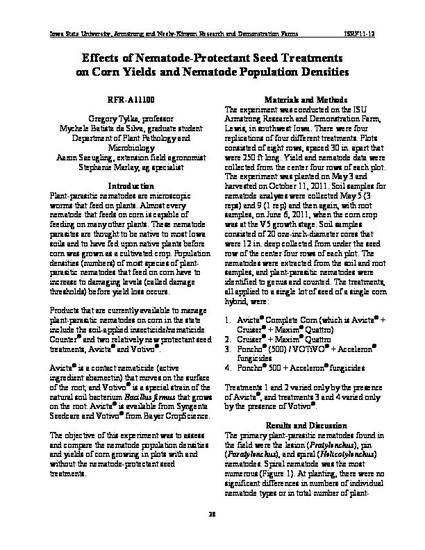
Article
Effects of Nematode-Protectant Seed Treatments on Corn Yields and Nematode Population Densities
Iowa State Research Farm Progress Reports
Farm
Armstrong Research and Demonstration Farm
Extension Number
RFR A11100
Publication Date
1-1-2012
Disciplines
Abstract
Plant-parasitic nematodes are microscopic worms that feed on plants. Almost every nematode that feeds on corn is capable of feeding on many other plants. These nematode parasites are thought to be native to most Iowa soils and to have fed upon native plants before corn was grown as a cultivated crop. Population densities (numbers) of most species of plant-parasitic nematodes that feed on corn have to increase to damaging levels (called damage thresholds) before yield loss occurs.
Products that are currently available to manage plant-parasitic nematodes on corn in the state include the soil-applied insecticide/nematicide Counter® and two relatively new protectant seed treatments, Avicta® and Votivo®.
Avicta® is a contact nematicide (active ingredient abamectin) that moves on the surface of the root, and Votivo® is a special strain of the natural soil bacterium Bacillus firmus that grows on the root. Avicta® is available from Syngenta Seedcare and Votivo® from Bayer CropScience.
The objective of this experiment was to assess and compare the nematode population densities and yields of corn growing in plots with and without the nematode-protectant seed treatments.
Copyright Owner
Iowa State University
Copyright Date
2012
Language
en
File Format
application/pdf
Citation Information
Gregory L. Tylka, Mychele Batista Da Silva, R. Aaron Saeugling and Stephanie Marlay. "Effects of Nematode-Protectant Seed Treatments on Corn Yields and Nematode Population Densities" (2012) Available at: http://works.bepress.com/gregory-tylka/28/
